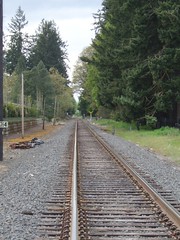
Knowing Knowledge Highlights 46-55
From George Siemens’ Knowing Knowledge:
Ultimately, whether online, face-to-face, or blended, learning and knowledge environments need to be democratic and diverse. A critical concept to keep in mind: The network and ecology must both be dynamic and capable of evolving, adapting, and responding to external change. pg. 47
Are our schools, and education in general, in a place that they can be seen as dynamic and capable of evolving? An interesting question. We were able to adapt and evolve to No Child Left Behind (NCLB) do to the pressures from the government. But if there was not money tied to the pressure to evolve would education have evolved on its own? I believe this could be part of the problem. We as humans do not evolve unless there is pressure applied to us to do so, and although we who are connected see the pressure to evolve, I do not think the typical teacher/school/district feels that pressure. That pressure only comes from us within the schools that are brining it to the attention of our administrators. There has been very little pressure put on the education system by corporations to change. Sure we see the reports, we hear Gates and others speak, but there is no pressure to change, therefore it does not happen.
Learning is continual. pg. 47
The more connective a knowledge stream, the more valuable. pg. 50
So the more connections you can find to the knowledge the more valuable it is? Interesting…isn’t this the same theory some search engines use to do page rank? The more connections made to a page the more valuable that information must be, therefore the link gets pushed up the page rank?
Knowledge moves too fast for learning to be only a product. pg. 51
I like this! Knowledge can never be a final project because of the rate of change. If knowledge can’t be a product, then it has to be a process in which you take an active role in developing and maintaining. How do you assess learning when learning is continual? Can we rely on standardized tests that focus on product to truly give us feedback on a process?
If what is before us is too unlike what is within us, we are not capable of forming a connection. pg. 52
 I think of teachers when I read this line. What lies before us in education is too unlike where we are or where we’ve come from, therefore we are not capable and do not understand where we need to go. If you could picture yourself standing on a time line of education like on a train track, and you look one way back on education you would see a very linear progression of growth, with very few large bumps. If you where then to turn and look at the future you would notice that the train tracks do not exist that actually you are standing at the end of the line why? To steal a line for Back to the Future: “Roads….where we’re going we don’t need…roads.”
I think of teachers when I read this line. What lies before us in education is too unlike where we are or where we’ve come from, therefore we are not capable and do not understand where we need to go. If you could picture yourself standing on a time line of education like on a train track, and you look one way back on education you would see a very linear progression of growth, with very few large bumps. If you where then to turn and look at the future you would notice that the train tracks do not exist that actually you are standing at the end of the line why? To steal a line for Back to the Future: “Roads….where we’re going we don’t need…roads.”
And I think that is what scares education. The future is changing so rapidly and education is not set up to be dynamic and evolving therefore we’re not sure where it is we are suppose to be going too. All we can see is what’s out there somewhere. Every child, no matter where they come from, is successful in life (Please note I use the word ‘life’ not ‘school’).
The capacity to connect produces the capacity to adapt. pg. 52
We have in the past seen knowledge as an object and learning as a product. But knowledge is really more of a stream…and learning more of a process. A product is a stopped process. pg. 52
We are too impatient with knowledge. We categorize it by imposing our models of organization.pg. 54
The ability to organize knowledge as we want it is a defining characteristic of our era. In the past, knowledge has been defined for us through editors, teachers, and experts. Now we do the organization ourselves. pg. 55
Knowledge is still seen as something we hold/possess based on its merits or application. This model will change quickly. Knowledge will be less of a product, and more of a process. pg. 55
 How true this is. I think a Master’s Degree is the perfect example. I can not tell you how many times I’ve heard teachers say “Now that I have this piece of paper I’ll get paid more.” I’m sure we all know people who have gone through school gotten the piece of paper just because that’s what you are suppose to do. I did it. I did learn something from my Master’s program but what I was really after was the product. The diploma and grade transcript that says I have passed these classes and have now learned something. Education is a product driven industry. You strive to earn the product of a diploma no matter what level of education you are at. Learning is not a process in our schools, it’s a means to an end. In just a few weeks seniors around the world will be handed their diplomas, and if they are like me…they’ll learn more in the next couple of years, then they did the 13 previous ones.
How true this is. I think a Master’s Degree is the perfect example. I can not tell you how many times I’ve heard teachers say “Now that I have this piece of paper I’ll get paid more.” I’m sure we all know people who have gone through school gotten the piece of paper just because that’s what you are suppose to do. I did it. I did learn something from my Master’s program but what I was really after was the product. The diploma and grade transcript that says I have passed these classes and have now learned something. Education is a product driven industry. You strive to earn the product of a diploma no matter what level of education you are at. Learning is not a process in our schools, it’s a means to an end. In just a few weeks seniors around the world will be handed their diplomas, and if they are like me…they’ll learn more in the next couple of years, then they did the 13 previous ones.
We like our products, and I really don’t have a problem with them as long as they are a product that allows us to assess the process of learning and is used to further that process for each individual student. If products are created as an end result, then we stop the learning process. Products should be viewed as part of the learning process, be kept over time, and used as a way to show progression in learning (can someone say portfolio). When we use products to assess the process we allow the process of learning to change, evolve, and be dynamic in nature.
OK…getting deep…I need to rethink some things.
Siemens, G (2006). Knowing Knowledge. Lulu.com.
[tags]knowing knowledge[/tags]
Technorati Tags: George Siemens, Knowing Knowledge







Dear Jeff
Below is a recent short post I put on Leadertalk and my blog. Your post here seems to connect and is giving me some ways to flesh out the concept. The concept came from our district level which is encouraging and interesting as the envelope is being pushed even though the implications are not clear….
Last week I attended a Professional Development meeting for principals in our area. Among the things discussed was reflective evaluation and planning for the future. One speaker presented the concept that we need a new model for thinking about our schools and how we approach administration. I did not make notes on what he suggested was the current model but the model he suggested for the future did catch my eye. He called it the Life Science Model and here is what I got down:
* Equilibrium is a precursor to death
* Living systems move to the edge of chaos
* Self organization and emergence take place
* Systems can not be directed along a linear path
Being comfortable with living on the edge of chaos is a real challenge for our educational system ( and myself as a type A personality) but I believe those of us who are embracing all things 2.0 see this as a reality. I am also struck by the fact that it is a mandate for living systems to approach that edge so we better get used to it …
I was also struck by the last statement…Systems can not be directed on along a linear path…can we substitute the word learning for systems? Or what about adding the word learning so we are talking about “Learning Systemsâ€.
I have not had time to fully process this but I am both challenged and given hope. This is the model I am moving toward so I am on the right track but it also is a radical shift from where I (we) have been in education. It pushes my boundaries. What do you think?
Barbara,
I think you’re on the right track. Being comfortable with chaos is difficult, but I agree it is where we need to be. Teaching and learning on the edge of chaos is a reality, I think, in today’s chaotic, fast paced, information overload world. My Superintendent a couple of weeks ago said, “There is a fine line between coherent and chaos.” I think he’s write. The problem I see is education likes the coherent side of that line and we don’t believe that education should be chaotic and messy…but that is exactly where we need to be!
Thanks for the conversation!
Jeff,
Thank you for this post. It has inspired much reflection on my end. This summer, I’ll begin my Master’s. It’s a venture I’ve begun once before.
The difference now is I’m enrolling in a program and school that will provide me with the right learning environment and experience to foster new ideas and push myself to explore facets of education heretofore unnoticed.
My first go at my Master’s was exactly what you describe in your post. It was about the product and not about the learning. While I’m sure I’ll enjoy the bump up the pay scale, I want to enjoy the journey more than the destination.
Thank you for making me think.